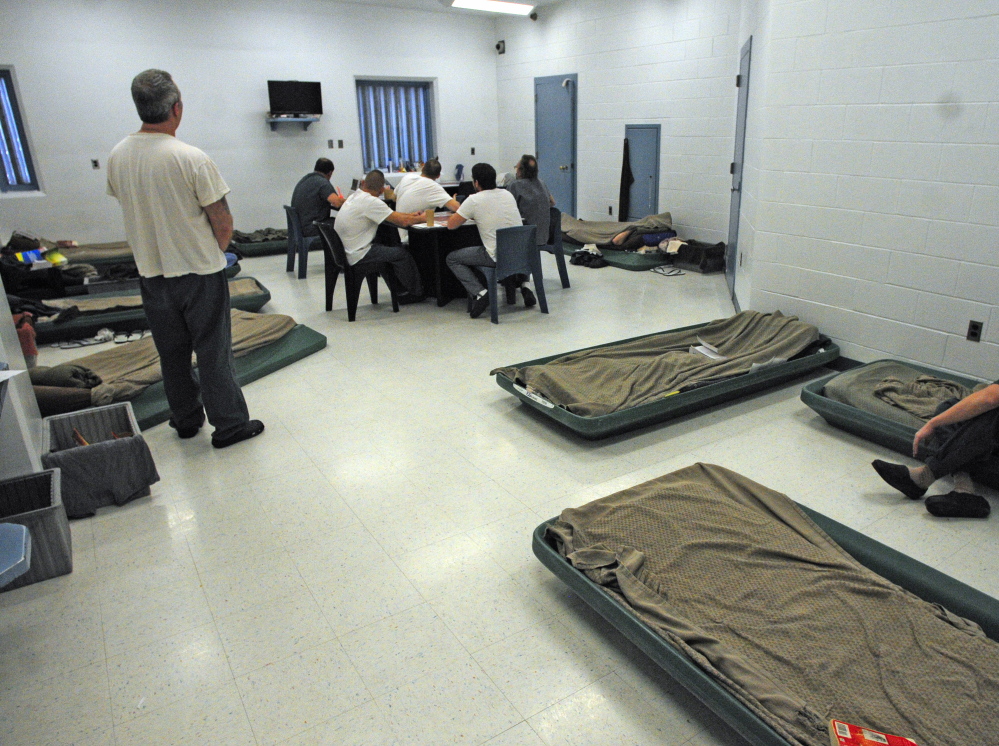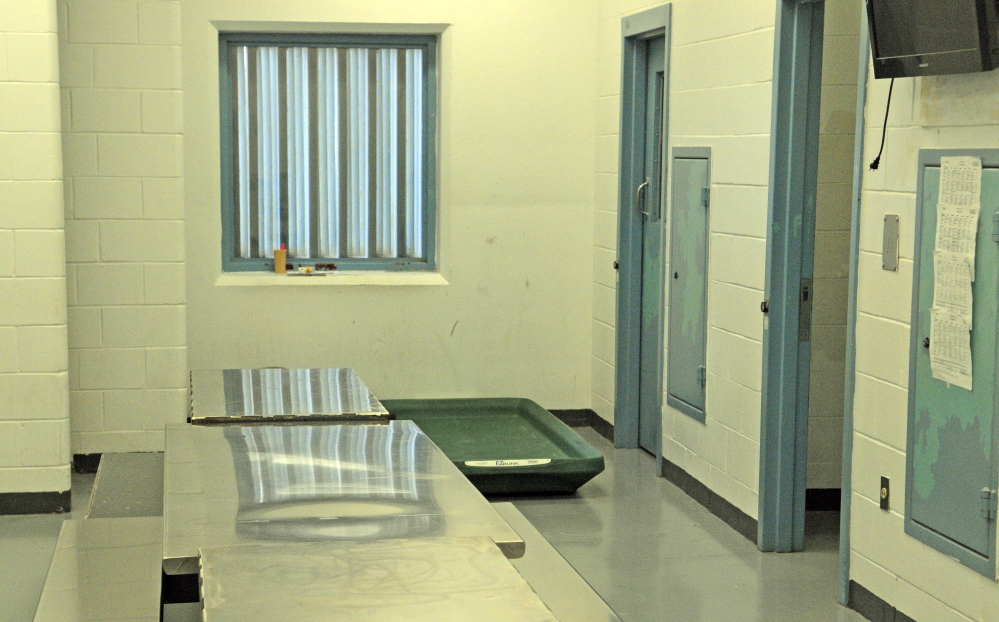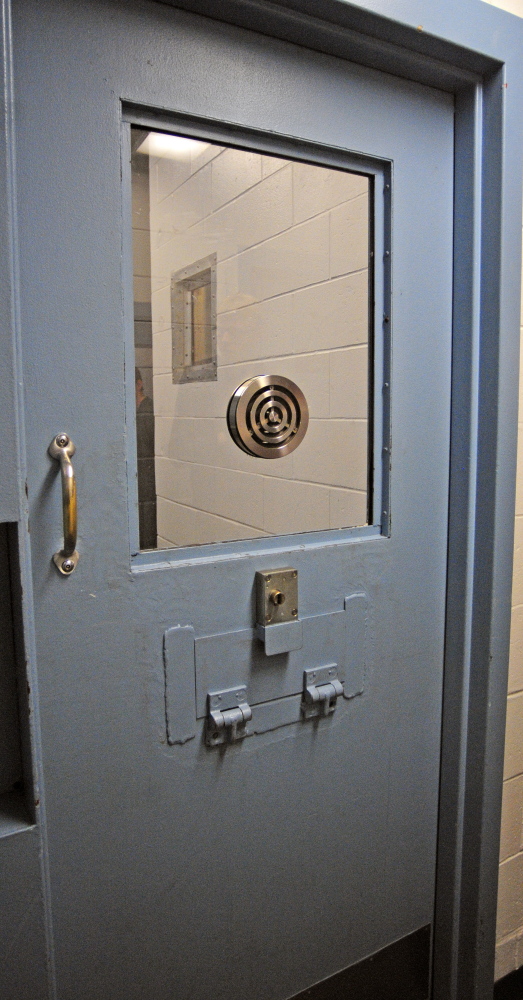AUGUSTA — A Kennebec County jail inmate saw a reporter and rushed to the glass in his cell. It was designed for one person, but he slept on a plastic cot on the floor. A roommate had the bed.
“It’s too crowded!” he yelled through the glass, waving his hands.
The jail in Augusta is one of two chronically overcrowded county jails in Maine. It averaged 173 inmates daily in 2014 — 20 more than in the year before — with an approved capacity of 147.
At the same time, violence in the jail has gone up: There were 98 inmate-on-inmate assaults and 10 inmate-on-staff assaults in 2014, compared with 39 and six in 2013.
On Thursday, a classroom doubled as a minimum-security dormitory with nine sled-like, plastic cots. Capt. Marsha Alexander, the jail administrator for the sheriff’s office, called the overcrowding an injustice.
“Sometimes you just can’t blame them for just acting out,” she said, “because there’s too many of them in the same room.”
When they act out, it can be dangerous. None of the 2013 assaults on officers were serious, but five were serious last year. In October, inmate Anthony Buck was charged with aggravated assault after police say he kicked a cell door shut on a correctional officer’s right hand, injuring three of Officer Robert Karwanski’s fingers. One had to be surgically re-attached, according to the police report.
There’s no end to the problem in sight, and officials say the overcrowding in Maine’s third-largest county jail is a symptom of many local and statewide issues, including:
• an influx of inmates with mental health issues that the jail is ill-equipped to handle;
• an increasing number of Kennebec County Superior Court criminal court filings — even as those have diminished statewide — due, in part, to more aggressive prosecution of certain crimes, including domestic violence;
• and a Maine jail system in political crisis, running a $2.5 million shortfall with the board that governs it virtually shut down by Gov. Paul LePage, who wants to change the way jails are run.
Problems have snowballed since Maine’s jail system consolidated in 2008, when the Legislature enacted a law giving the state more control over the jail system.
Technically, Maine has enough room for its inmates. The average daily county jail population is under 1,900 and there are more than 2,000 beds statewide, said Ryan Thornell, executive director of the Maine Board of Corrections.
But overcrowding persists in Kennebec and Penobscot counties because of a lack of funding and staffing at jails with open beds, and Thornell said the Augusta jail is in “a terrible position.”
“It is, in my opinion, dangerously overcrowded,” he said, “and it’s hard to find a solution — at least, a short-term solution.”
‘SHOULDN’T BE HERE’
Patients who shuffle between the Riverview Psychiatric Center and Kennebec County jail are often accused of new crimes or waiting for evaluations at the psychiatric hospital.
On Thursday, Leroy Smith stood at the glass in his cell, staring at people in the jail’s intake area. The 25-year-old Gardiner man was accused of murder in May after police say he dismembered his father and dumped his body in the Richmond woods. Earlier this month, he was found incompetent to stand trial, with a state psychologist saying he has a mental illness.
Just down the hall from Smith, a woman is being held. In her cell, five crayons balanced on a short privacy wall. The woman often harms herself or assaults staff, so coloring is a reward that reinforces good behavior, Alexander said.
“We give her crayons and coloring paper so she’ll draw pictures for us,” Alexander said. “It keeps her occupied.”
Officials said about half of the inmates are typically on psychotropic drugs, and three of the five suspects in serious 2014 assaults on officers have mental illnesses. Recently, the jail held as many as 15 people who had been patients at Riverview. On Thursday, the sheriff’s office said six inmates should have been there.
Daniel Wathen, the court master overseeing Riverview’s compliance with a consent decree that settled a 1989 lawsuit against the state, said the hospital is making strides to accommodate jail inmates with mental illnesses. However, it saves one bed for jail patients, and most days six or seven people are on a waiting list for it.
“Obviously, if you can’t get in, it’s not good, but it’s an improvement over the past,” he said.
Alexander said the influx of inmates who are mentally ill is time-intensive for corrections officers, exacerbating the effects of overcrowding. Case workers often can’t spend one-on-one time with inmates who have mental illnesses, as they’re often triaging others in crisis, she said. That has reduced programming and harmed the facility’s ability to help inmates, she said.
Two full-time mental health workers staff the jail. One, Karen Heavey, said with a lack of beds at state psychiatric hospitals, they’re forced “to keep people stable” in a jail environment.
“These are the people that society doesn’t want in public and there’s nowhere to put them,” she said, “and they shouldn’t be here.”
WORKLOAD OVERLOAD
Also, Kennebec County’s major criminal court caseload has gotten larger in recent years while it has shrunk statewide. This increases the jail’s workload.
The number of new criminal filings in Kennebec County Superior Court, which handles major crimes and jury trials, rose from 982 to 1,280 — or 30 percent — between 2010 and 2014, according to state data. Statewide, Maine reduced those filings by 18 percent over the same time period.
This is because of a host of factors, said District Attorney Maeghan Maloney. The Maine attorney general’s office, based in Augusta, files many cases in Kennebec County Superior Court, and the county has specialty court programs for veterans and those with substance abuse disorders. But Maloney’s office has aggressively prosecuted felonies, especially domestic violence offenses for which penalties have been increased by legislators in recent years.
“In general, we’re trying to treat the most serious crimes as seriously as we can and the less serious crimes less seriously,” Maloney said, also putting gang-related activity and aggravated drug traffickers in that elevated category.
Gangs also affect the jail, Alexander said. On Thursday, a jail count said there were 21 inmates with suspected gang ties.
They include the Black P. Stones, a street gang based in the mid-Atlantic that police say now have a presence in Augusta. In 2013, one drug bust netted four alleged members of that gang. The jail also houses members of the Aryan Brotherhood, a white supremacist gang whose members Alexander said shouldn’t mingle with P. Stones, who shouldn’t mingle with members of the Black Disciples, their rivals.
Officials also blame gangs for much of the inmate-on-inmate violence. Last week, Alexander said two inmates — one with gang ties — beat another inmate. Only five of the victims in the 98 inmate assaults last year pressed charges, but she said the most recent victim may decide to move forward with charges.
Kennebec County Sheriff Randall Liberty’s jail would also house more people if it wasn’t sending inmates to other jails and using alternative bail and sentencing conditions that link suspects to Maine Pretrial Services, a nonprofit that manages release and supervision of certain people accused or convicted of crimes. On Thursday, 81 inmates were in other jails, and 130 people who could be in jail were in alternative programs.
While Liberty said people linked to domestic violence, drug and gang crime must be jailed, area law enforcement agencies could write more summonses for misdemeanor offenses instead of taking suspects to jail. Even though their stays are typically short, Liberty said his office and other police departments “need to brainstorm and realize that the bed space in the Kennebec County Correctional Facility is finite.”
“The question becomes, ‘Who do we want to be in those beds?'” the sheriff said.
POLITICAL CRISIS
There’s no immediate political fix for jails on the horizon.
Before the jail system was consolidated in 2008, counties passed large property tax increases to pay for jails. The revenues used to pay for jails were capped at $62 million. The state promised to cover costs above the cap.
Now, jails cost $82.5 million to run. But the state is only funding the system at $80 million, leaving the $2.5 million shortfall for this fiscal year.
Last year, legislators passed a bill giving the Board of Corrections more authority over the jails, making it easier to transfer inmates between facilities, creating a more controlled budget process and creating a system-wide capital improvement plan.
But LePage opposed it, with one of his lawyers testifying that the jail system should be either state- or county-run. In a veto message, the Republican governor blasted the bill, saying the system “should be a case study in how wrong Democrat experiments can go” and that legislators didn’t tackle a troubling problem in Maine’s budget.
Legislators overrode his veto, but LePage has held up the law ever since. In May, resignations put the five-member Board of Corrections at three members — short of the four-member quorum needed to pass rules to implement the new law. Only LePage can replace members, and this month another member resigned. Thornell will leave on Jan. 28.
Last week, LePage told the Maine Public Broadcasting Network that he won’t appoint new members or support more jail funding until the Legislature passes a new law to overhaul the system. The governor “does not support and will not support additional money for a broken system that has little accountability and a lack of efficient management of its financial operations,” said Adrienne Bennett, LePage’s spokeswoman.
Thornell said while people “shouldn’t point fingers” at LePage because of his long-standing position, many of the new law’s provisions would make the system better.
“While the governor was only reiterating his position, it kind of hamstrung the board from trying to demonstrate any type of success,” Thornell said.
Now, Thornell is resigned to a future in which either the counties or state takes over the system, saying “it seems that the writing is on the wall that the Board of Corrections is no longer wanted in the state of Maine.” House Speaker Mark Eves, D-North Berwick, said in a statement that he expects the Legislature to address jail funding and administration in the coming months, but his caucus is “weighing our options.”
“Our first priority is public safety,” Eves said, “and we must also consider the impact any change in the system would have on property taxpayers.”
Kennebec County Administrator Robert Devlin isn’t ready to give up on the system as it is now. He’s on the committee drafting rules for the 2014 law that can’t be acted on, and he said LePage should “help us get the work done” and not put up “a blockade.”
“There has to be some faith we can make it work,” Devlin said. “We’ve put a lot of work into this over the years, and I still believe a unified system can work.”
Michael Shepherd — 370-7652
Twitter: @mikeshepherdme
Send questions/comments to the editors.








Success. Please wait for the page to reload. If the page does not reload within 5 seconds, please refresh the page.
Enter your email and password to access comments.
Hi, to comment on stories you must . This profile is in addition to your subscription and website login.
Already have a commenting profile? .
Invalid username/password.
Please check your email to confirm and complete your registration.
Only subscribers are eligible to post comments. Please subscribe or login first for digital access. Here’s why.
Use the form below to reset your password. When you've submitted your account email, we will send an email with a reset code.